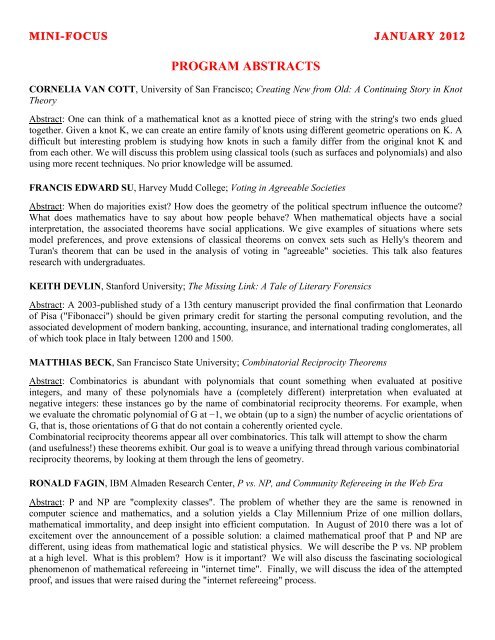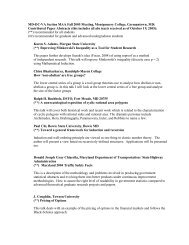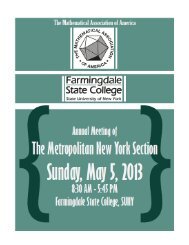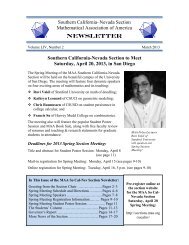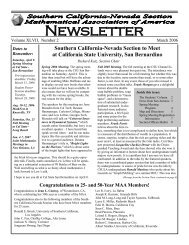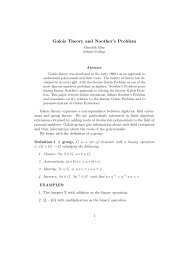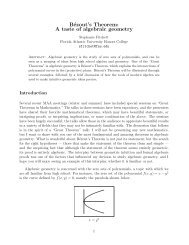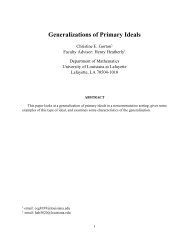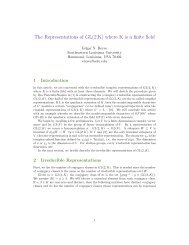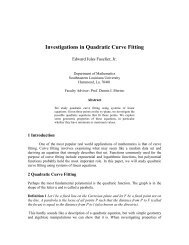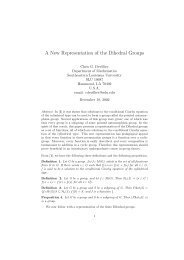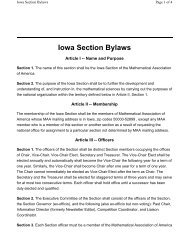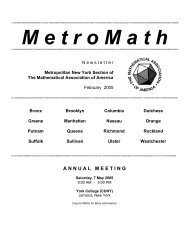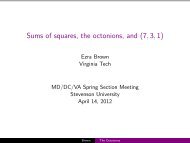MINI-FOCUS - Sections - Mathematical Association of America
MINI-FOCUS - Sections - Mathematical Association of America
MINI-FOCUS - Sections - Mathematical Association of America
You also want an ePaper? Increase the reach of your titles
YUMPU automatically turns print PDFs into web optimized ePapers that Google loves.
<strong>MINI</strong>-<strong>FOCUS</strong> JANUARY 2012<br />
PROGRAM ABSTRACTS<br />
CORNELIA VAN COTT, University <strong>of</strong> San Francisco; Creating New from Old: A Continuing Story in Knot<br />
Theory<br />
Abstract: One can think <strong>of</strong> a mathematical knot as a knotted piece <strong>of</strong> string with the string's two ends glued<br />
together. Given a knot K, we can create an entire family <strong>of</strong> knots using different geometric operations on K. A<br />
difficult but interesting problem is studying how knots in such a family differ from the original knot K and<br />
from each other. We will discuss this problem using classical tools (such as surfaces and polynomials) and also<br />
using more recent techniques. No prior knowledge will be assumed.<br />
FRANCIS EDWARD SU, Harvey Mudd College; Voting in Agreeable Societies<br />
Abstract: When do majorities exist? How does the geometry <strong>of</strong> the political spectrum influence the outcome?<br />
What does mathematics have to say about how people behave? When mathematical objects have a social<br />
interpretation, the associated theorems have social applications. We give examples <strong>of</strong> situations where sets<br />
model preferences, and prove extensions <strong>of</strong> classical theorems on convex sets such as Helly's theorem and<br />
Turan's theorem that can be used in the analysis <strong>of</strong> voting in "agreeable" societies. This talk also features<br />
research with undergraduates.<br />
KEITH DEVLIN, Stanford University; The Missing Link: A Tale <strong>of</strong> Literary Forensics<br />
Abstract: A 2003-published study <strong>of</strong> a 13th century manuscript provided the final confirmation that Leonardo<br />
<strong>of</strong> Pisa ("Fibonacci") should be given primary credit for starting the personal computing revolution, and the<br />
associated development <strong>of</strong> modern banking, accounting, insurance, and international trading conglomerates, all<br />
<strong>of</strong> which took place in Italy between 1200 and 1500.<br />
MATTHIAS BECK, San Francisco State University; Combinatorial Reciprocity Theorems<br />
Abstract: Combinatorics is abundant with polynomials that count something when evaluated at positive<br />
integers, and many <strong>of</strong> these polynomials have a (completely different) interpretation when evaluated at<br />
negative integers: these instances go by the name <strong>of</strong> combinatorial reciprocity theorems. For example, when<br />
we evaluate the chromatic polynomial <strong>of</strong> G at −1, we obtain (up to a sign) the number <strong>of</strong> acyclic orientations <strong>of</strong><br />
G, that is, those orientations <strong>of</strong> G that do not contain a coherently oriented cycle.<br />
Combinatorial reciprocity theorems appear all over combinatorics. This talk will attempt to show the charm<br />
(and usefulness!) these theorems exhibit. Our goal is to weave a unifying thread through various combinatorial<br />
reciprocity theorems, by looking at them through the lens <strong>of</strong> geometry.<br />
RONALD FAGIN, IBM Almaden Research Center, P vs. NP, and Community Refereeing in the Web Era<br />
Abstract: P and NP are "complexity classes". The problem <strong>of</strong> whether they are the same is renowned in<br />
computer science and mathematics, and a solution yields a Clay Millennium Prize <strong>of</strong> one million dollars,<br />
mathematical immortality, and deep insight into efficient computation. In August <strong>of</strong> 2010 there was a lot <strong>of</strong><br />
excitement over the announcement <strong>of</strong> a possible solution: a claimed mathematical pro<strong>of</strong> that P and NP are<br />
different, using ideas from mathematical logic and statistical physics. We will describe the P vs. NP problem<br />
at a high level. What is this problem? How is it important? We will also discuss the fascinating sociological<br />
phenomenon <strong>of</strong> mathematical refereeing in "internet time". Finally, we will discuss the idea <strong>of</strong> the attempted<br />
pro<strong>of</strong>, and issues that were raised during the "internet refereeing" process.


